

Why I Became a “Covid Denier” Kevin Smith There have been a wide selection of articles published here over the last year on Covid-19 and lockdowns.
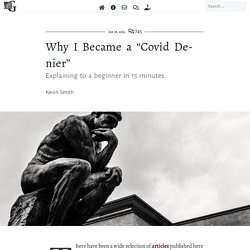
Since March, the thinking of many of us has evolved which has been reflected within the articles as time has gone on. America Is Trapped in a Pandemic Spiral. Updated at 5:28 p.m.
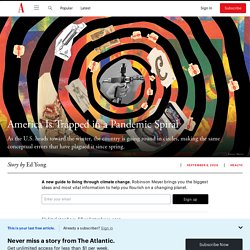
ET on September 13, 2020. Army ants will sometimes walk in circles until they die. The workers navigate by smelling the pheromone trails of workers in front of them, while laying down pheromones for others to follow. If these trails accidentally loop back on themselves, the ants are trapped. Two decades of pandemic war games failed to account for Donald Trump. Like all pandemics, it started out small.
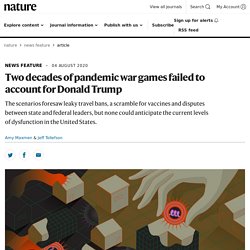
A novel coronavirus emerged in Brazil, jumping from bats to pigs to farmers before making its way to a big city with an international airport. From there, infected travellers carried it to the United States, Portugal and China. Within 18 months, the coronavirus had spread around the world, 65 million people were dead and the global economy was in free fall. This fictitious scenario, dubbed Event 201, played out in a New York City conference centre before a panel of academics, government officials and business leaders last October.
Special report: The simulations driving the world’s response to COVID-19. When Neil Ferguson visited the heart of British government in London’s Downing Street, he was much closer to the COVID-19 pandemic than he realized.
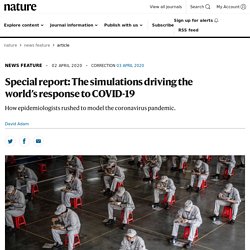
Ferguson, a mathematical epidemiologist at Imperial College London, briefed officials in mid-March on the latest results of his team’s computer models, which simulated the rapid spread of the coronavirus SARS-CoV-2 through the UK population. Less than 36 hours later, he announced on Twitter that he had a fever and a cough. A positive test followed. The disease-tracking scientist had become a data point in his own project. Ferguson is one of the highest-profile faces in the effort to use mathematical models that predict the spread of the virus — and that show how government actions could alter the course of the outbreak. Questions, just questions – steel city scribblings. On March 26 this year, Professor Sucharit Bhakdi wrote an open letter to German Chancellor, Dr.
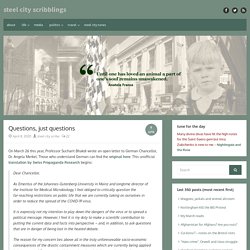
Angela Merkel. Those who understand German can find the original here. This unofficial translation by Swiss Propaganda Research begins: Dear Chancellor,As Emeritus of the Johannes-Gutenberg-University in Mainz and longtime director of the Institute for Medical Microbiology, I feel obliged to critically question the far-reaching restrictions on public life that we are currently taking on ourselves in order to reduce the spread of the COVID-19 virus.It is expressly not my intention to play down the dangers of the virus or to spread a political message. Covid Announces Plan To Move Operations To Texas Full-Time To Escape Burdensome Regulations. AUSTIN, TX—Bemoaning the bureaucratic red tape that had been holding it back for the past year, the Covid-19 virus announced Thursday that it would move its operation to Texas full-time to escape burdensome regulations.
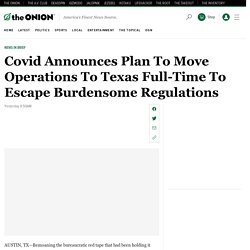
“Shifting my operation to Texas will give me the freedom to spread my wings and grow this pandemic in ways that are impossible in blue states,” said the coronavirus molecule, adding that it had been especially heartened by the governor’s recent decision to cut away unnecessary regulations like dining restrictions and mask mandates. “Obviously, I appreciate everything California and New York have done to help me—especially when I was just starting out. -19: The unofficial UK inquiry—why did so many have to die? - Prospect Magazine. Governing is always difficult, and this is doubly true in the face of a grave and unfamiliar threat.
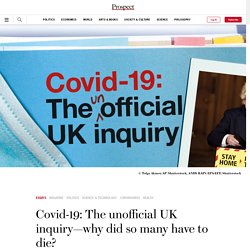
The challenge of a novel, deadly and contagious coronavirus is one that has confronted governments around the planet. But a year into the crisis it is plain that nations have not risen to it with equal efficacy. Going by the figures collated on Statista.com in mid-January, a randomly chosen Briton is now 35 times more likely to have died of Covid-19 than a random Australian, 39 times more likely than the average citizen of Japan and 55 times more likely than a typical South Korean. The lethal danger in Britain is 249-fold that in New Zealand, and 369 times that in China, where the virus emerged. The UK government can point to the differences in demographics, population density or culture in some cases, and question the reliability of statistics in others. Most COVID cases don’t spread virus—it’s the superspreaders we need to stop.
Much about how the new coronavirus spreads from one victim to the next remains a maddening mystery.
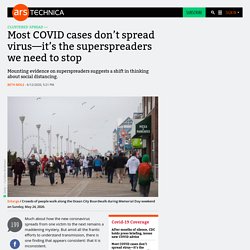
But amid all the frantic efforts to understand transmission, there is one finding that appears consistent: that it is inconsistent. Some people—most, even—don’t spread the virus to anyone in the course of their infection. Biden Delivers a Reality Check – BillMoyers.com. Biden Delivers a Reality Check Cases of coronavirus are spiking across the country.
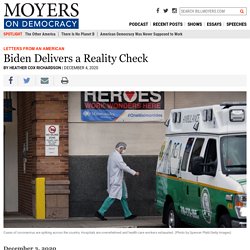
Hospitals are overwhelmed and health care workers exhausted. (Photo by Spencer Platt/Getty Images) Coronavirus Live Update: 416916 Cases Detected in 172 Countries. How the pandemic might play out in 2021 and beyond. June 2021.
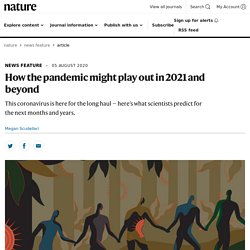
The world has been in pandemic mode for a year and a half. The virus continues to spread at a slow burn; intermittent lockdowns are the new normal. An approved vaccine offers six months of protection, but international deal-making has slowed its distribution. The Coronavirus Inflicts Its Own Kind of Terror. BRUSSELS — The coronavirus has created its own form of terror. It has upended daily life, paralyzed the economy and divided people one from another. It has engendered fear of the stranger, of the unknown and unseen. It has emptied streets, restaurants and cafes. It has instilled a nearly universal agoraphobia. Lockdown One Year On – It doesn’t work, it never worked & it wasn’t supposed to work. Kit Knightly And so we come to March 23rd, and lockdown’s first birthday. Or, as we call it here, the longest two weeks in history.
The Cop-Out of “Follow the Science” — The New Atlantis. The coronavirus pandemic has been a disaster in nearly every respect. As I write this, half a million Americans have died from the disease, ten times as many as died from flu and pneumonia in 2019. Many who recover continue to suffer mysterious, lingering symptoms. The harsh restrictions imposed on us have been devastating to workers, small businesses, mental health, and students, particularly children and teens.
The culpability for this disaster is — or should be — owned by the politicians who have the power to mobilize our extensive technocratic state against such a crisis. But time and time again, leaders in America have offloaded their responsibility onto other parties. This COVID-19 pandemic timeline shows the coronavirus’ impact.
Few people noticed on New Year’s Eve last year when China reported a mystery illness to the World Health Organization. But soon, the never-before-seen coronavirus responsible for the disease was infiltrating the rest of the world. As we prepare to enter the second year of the COVID-19 pandemic, Science News looks back on how the disease took over 2020 and how society attempted to fight back. December 31, 2019. Localtrust.thinking on COVID-19 impact on future of communities. Politics Will COVID-19 remake the world? Dani Rodrik argues that COVID-19 is driving countries towards 'becoming exaggerated versions of themselves', with globalisation retreating and authoritarianism entrenching itself.
Pandemics and Traditional Plant-Based Remedies. A Historical-Botanical Review in the Era of COVID19.
Do We Need Mask Mandates? Playability. LA art experiences focus on how we heal from the pandemic. Economonie. Homeward Bound. Interventionally. Transformation.